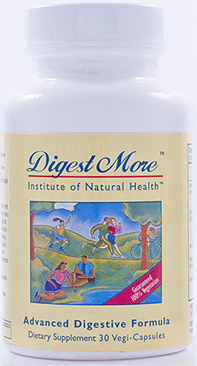Digest More 30s
$15.00
Helps Digest Proteins, Carbohydrates, & Fats For A Full Meal In One Capsule!
List Price: $30.00
Member Price: $15.00
Product Description
Digest More is the most comprehensive vegetarian enzyme supplementation available anywhere. It helps break down proteins, fats, carbohydrates, sugars, milk and fibers, thus improving general digestion.* Good digestion is the pillar of good health. Digest More is highly recommended for enhancing the effectiveness of all herbal supplements by improving their absorption. In particular, cellulose and CereCalase break down the cellulose that encapsulates the nutrients. Enzyme supplementation is important because enzymes are destroyed or depleted when food and herbal supplements are cooked, processed or refined. Digest More may improve GI function with those people who drink milk or eats lots of vegetables and/or beans.
Formulation:
Each capsule contains:
n*zimes proprietary blend 154 mg
for Protein:
Protease 4.5 6000%, Protease 3.0 8%, Protease 6.0 2500%.
for Fat:
Lipase FCC 100%
for Carbohydrates:
Amylase 5000%, Glucoamylase 7.50%, Malt Diatase 300%.
for Raffinose Sugars:
Alpha-Galactosidase 155%
for Milk Sugar:
Lactase 1500%
for Fiber:
Cellulose 100%, CereCalase 250%.
Herbal Extracts:
Ginger Phizome 20mg, Slippery Elm Bark 20mg, Fennel Seed 10mg.
Other Ingredients: vegetable cellulose, rice bran, water. Soy Lecithin Oil Blend is used as a processing aid.
Suggested Usage:
Take one capsule with water one hour before breakfast to complement other supplements. General Digestive: one to two capsules before breakfast and before dinner for one week. Then take one capsule every morning. Digestive Problems: two capsules before each meal. As needed adjust the number of capsules.
Size(s) Available:
Bottles of 30
Low stomach acidity: Medical researchers since the 1930s have been concerned with the consequences of too little stomach acid While all the health consequences are still not entirely clear, some have been well documented.
Many minerals and vitamins require proper stomach acid to be absorbed optimally�examples are iron, calcium, zinc, and B-complex vitamins, including folic acid. People with achlorhydria (no stomach acid) or hypochlorhydria (low stomach acid) may be at risk for developing certain mineral deficiencies. Since minerals are important not only for body structure (as in bones and teeth) but also to activate enzymes (such as superoxide dismutase) and hormones (such as insulin), deficiencies can lead to health problems.
One of the major tasks of stomach acid is to break proteins down to the point that pancreatic proteolytic enzymes can easily work. If this does not occur, these proteins might be absorbed in more complicated chains. This malabsorption has been suggested by some researchers to be a major cause of immunological stress and food allergies.
In addition, partially digested protein provides a favorable environment for �unfriendly� bacteria that live in the colon. Some of these bacteria produce toxic substances that can be absorbed by the body.
Antacids: To relieve heartburn, some people try antacids, which often provide symptomatic relief. Antacids can have their own side effects as well, since they can interfere with the absorption of some vitamins and minerals.
Nutrients that might be helpful: Lactose intolerance can cause many digestive problems, including gas, cramps, and diarrhea; in such cases, the lactase enzyme can be helpful when taken before consuming dairy products. Pancreatic enzymes, which include lipase, aids in the digestion of fats and acts as a digestive aid.
Probiotics, such as acidophilus, promote healthy digestion. Enzymes secreted by probiotic bacteria also aid digestion. Acidophilus is a source of lactase enzyme, which is needed to digest milk but is lacking in lactose-intolerant individuals.
Herbs that may be helpful: Chamomile is effective in relieving inflamed or irritated mucous membranes of the digestive tract.
Chamomile is typically taken in tea form three to four times per day, between meals. Boiling water is poured over dried flowers and allowed to steep. Other options are to mix 3�5 ml of chamomile tincture with hot water or to take 2�3 grams of chamomile in capsule or tablet form.
There are numerous other carminative herbs, including European angelica (Angelica archangelica) root, anise, cardamom, cloves, coriander, dill, ginger, rosemary, and sage. Many of these are common kitchen herbs and thus are easily available for making tea to calm an upset stomach.
Licorice protects the mucous membranes lining the digestive tract by increasing production of mucin, a substance that protects against stomach acid and other harmful substances. Licorice root in its deglycyrrhizinated form (DGL) has the glycyrrhizic acid removed (glycyrrhizic acid is the portion of licorice root associated with increasing blood pressure and water retention in some persons). The mucous membrane-healing part of the root, however, remains in DGL. One to two chewable tablets of DGL (250�500 mg) can be taken fifteen minutes before meals and one to two hours before bedtime and may provide relief.*
* These statements have not been evaluated by the Food and Drug Administration. This product is not intended to diagnose, treat, cure or prevent any disease.
Be the first to review “Digest More 30s”
You must be logged in to post a comment.
 Maximum Multiple 30s
Maximum Multiple 30s  EPA Select 1200 90s
EPA Select 1200 90s 






Reviews
There are no reviews yet, would you like to submit yours?